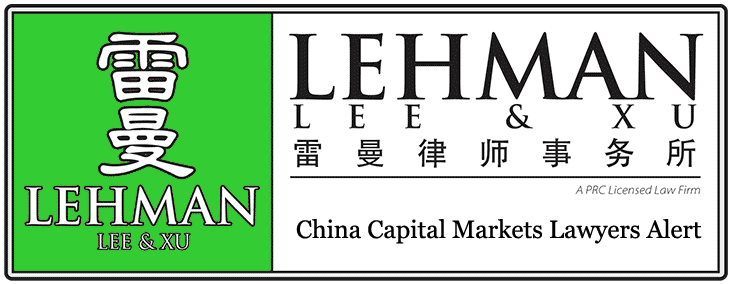

 |
|
LEHMAN, LEE & XU China Lawyers
|
|
China Capital Markets law In The News
|
|
April 2014
|
The China Law News keeps you on top of business, economic and political events in the China. |
|
|
|
In the News |
China Yuan Reforms Seen Pushing Asset Markets Into World's Top Two |
China is poised to accelerate liberalization of its capital and foreign exchange markets, a move that will turn the yuan into a major reserve currency within 10 years and catapult Chinese stock and bond markets into the ranks of the world's two biggest, according to researchers from an Australian government-sponsored think tank. A comprehensive report by Geoff Weir and Kathleen Walsh from Australia's Center for International Finance and Regulation argues that if new experiments with free-market finance in the Shanghai Free Trade Zone succeed, the Chinese government will expedite the opening up of its capital account. Such a move, which would allow more or less unrestricted exchange of yuan for other currencies, has been flagged as a five-year goal by the Chinese Communist Party's Central Committee. Nonetheless, many observers are skeptical it will happen quickly, mostly because "convertibility" for the yuan--also known as the renminbi, or RMB--would deeply challenge the profitability of China's mammoth banking system. In contrast to these skeptics, the CIFR researchers conclude that "in the absence of some major setback, substantial progress will have been made in internationalizing the RMB within 10 years, with capital controls largely or completely lifted, borrowing and lending rates market-determined, the exchange rate market-determined and the RMB having become a significant international reserve asset." Their findings are based on interviews with numerous Chinese officials and more than 100 Chinese companies, they said. The CIFR paper will be released Wednesday at a major conference on Chinese financial reforms in Sydney to be attended by Australian and Chinese academics, bankers and policy makers. By opening up the economy to foreign capital flows, these reforms will catalyze China's securities markets, the report said. Based on modeling by the Australia & New Zealand Banking Group of different economies' capital markets relative to their size, Mr. Weir and Ms. Walsh conclude that China's equity market would have a market capitalization of around $30 trillion in 10 years, or just under 25% of projected world market capitalization, compared with $22 trillion for the U.S. Additionally, China's bond market could become the second-largest after the U.S., equaling that of the entire euro zone. "The theme here is that size matters," said Mr. Weir in a phone interview, noting that China's economy, currently the world's second largest, is widely projected to surpass the United States' before the end of the decade. Given a long-standing dependence on bank finance, China's bond market remains significantly underdeveloped. But the CIFR researchers point out that special offshore yuan-denominated bond markets have grown rapidly in recent years, especially in Hong Kong, and that opening up the capital account would harmonize the onshore and offshore markets while authorities would unwind policies that encourage dependence on bank lending. Currently, individuals are limited to purchases of no more than $50,000 in foreign currency and, other than important exemptions for foreign direct investment, firms must provide proof of export or import activity or of service-related current-account payments before engaging in foreign exchange transactions. Meanwhile, the banking system remains protected from market forces, with the government fixing maximum deposit rates and setting lending quotas. In a paper released in conjunction with the CIFR report, University of California at Berkeley economist Barry Eichengreen argued that the government faces a timing dilemma in liberalizing these two components of the existing financial legal framework. An open capital account, which would allow Chinese savers to withdraw deposits and seek higher returns overseas, could cause significant distress to the banking system but liberalizing the financial system could slow down the drive to ease capital controls, he wrote, citing a middle-ground compromise of parallel, piecemeal liberalization as an alternative approach. Regardless, recent moves from the People's Bank of China have fueled expectations that restrictions in both areas will soon be lifted. First, PBOC Governor Zhou Xiaochuan announced that interest-rate liberalization would be completed within one to two years. Then the central bank widened the trading band within which the yuan can float freely versus the dollar. In a report last week, HSBC predicted the yuan would be fully convertible within just two to three years, bringing forward its already aggressive forecast of a five-year timetable. In turn, the bank argued, the yuan would become a reserve currency in central banks' asset holdings "faster than many expect." The CIFR researchers took a similar view, contending that Chinese government bonds "may well become the main alternative 'safe asset' to U.S. Treasuries." The yuan's near-term ability to compete with the dollar as a reserve currency is questioned by many economists. Among other limitations, they point out that in a country where key enterprises enjoy special protection, China's centrally controlled capital markets lack the property rights and good-governance protections demanded by foreign investors. In an interview, Geoff Weir acknowledged that China has work to do in "institutional reform," but he said its leaders are acutely aware of the need to improve governance, evident in their efforts to earn the inclusion of Chinese company shares in international stock indexes. |
China cabinet pledges capital market opening, IPO reform |
(Reuters) - China will further open up its capital markets and push forward reforms of the country's initial public offering (IPO) regime, the State Council, or cabinet, said in a statement on Tuesday. The government will also promote the development of futures markets, including commodity-based futures products, the statement said. The announcement came after a regular cabinet meeting. The cabinet also pledged to promote the healthy development of online financial services. http://www.reuters.com/article/2014/03/25/us-china-cabinet-idUSBREA2O0OU20140325 |
|
|
|
|
| Proud Member of |